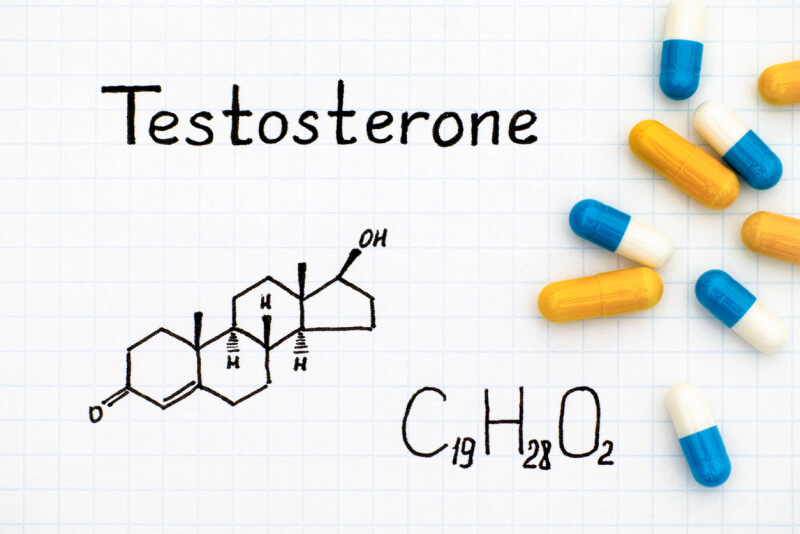
Testosterone is an important hormone that is produced at higher levels in men than in women, and it is responsible not only for the development of unique male characteristics but also regulates brain function and behavior. But as in women, males can also experience menopause or andropause where the testosterone hormone levels decline due to age. Testosterone therapy can help with the symptoms of cognitive decline that are associated with low testosterone.
So what are the side effects of male hormone replacement therapy neurological and cognitively speaking? If you’re taking testosterone supplementation for low T levels, hormone therapy can help improve cognitive function and may have protective effects on certain neurodegenerative disorders like Alzheimer's disease and Parkinson's disease.
To better understand how testosterone can influence neurological diseases and cognitive ability, let’s look at how male hormones are produced in the body. Testosterone and estrogen are important gonadal hormones, also known as sex hormones, that are produced in the reproductive organs of males and females.
Males produce testosterone at a much higher quantity than females where oestrogen and progesterone are the more dominant hormones. The amount of testosterone secreted by the male organs is controlled by the hypothalamus, a small part of the brain, and the pituitary gland. The pituitary gland releases growth hormone, luteinizing hormone, and follicle-stimulating hormone which regulates hormone activity and production.
High testosterone concentration is not a common concern among men. However, taking anabolic steroids (which is common in athletes) and other medications intended to increase muscle mass may result in abnormally elevated testosterone levels.
High testosterone hormones may have symptoms of impaired judgment, irritability, aggression, mood swings, high blood pressure, headaches, insomnia, and possible infertility.
Women can also produce testosterone in small amounts in the ovaries. Polycystic ovaries is one of the conditions that indicate hormone imbalance in women. Imbalance in high testosterone and estrogen levels in women may also cause anxiety, depression, irregular periods, increased acne breakouts, increased muscle mass, and deepening of the voice.
Testosterone deficiency is a widespread problem among adult men. The production of testosterone naturally dips about 1 percent every year once men reach the age of 30. If needed, a serum testosterone test may be done to determine your hormone levels.
Aside from its natural decline with age, low testosterone may be a result of pituitary adenomas which are benign growths or pituitary tumors in the pituitary glands. Hypogonadism is another condition where the male reproductive organs do not produce enough testosterone to support normal function.
Common signs of low testosterone in men are decreased muscle mass and low bone density, hot flashes, reduced body and facial hair, erectile dysfunction, fatigue, increased body fat, breast enlargement or gynecomastia, low libido, and reduced sperm count.
Low testosterone has also been linked to affecting the brain and cognitive function. Difficulty with concentration, frequent memory loss, and reduced mental capacity among older men is associated with the decreasedtestosterone. One study showed that cognitive decline and ‘brain fog’ are more common in men who are 70 years and above and experienced natural decline in their testosterone levels.
Testosterone may also have effects on the part of the brain that affects men’s moods and feelings. Men with low testosterone report mood changes and experience symptoms of anxiety, depression, and overall poor quality of life.

Studies show that testosterone may have significant effects on brain development, particularly on neurodegeneration. Neurodegeneration pertains to any changes that affect the nervous system and leads to deterioration of neurological functions such as motor movement and memory.
Low testosterone in males is believed to play a role in the susceptibility of brain tissues to oxidative stress and damage that may induce certain neurological disorders. Some of the common neurodegenerative diseases are Alzheimer's disease, Parkinson's disease, and dementia. These disorders occur as a result of the gradual loss of function of the nerve cells in the brain and loss of healthy brain tissue.
Before taking testosterone hormone treatment, it’s important to discuss with your health care provider about the possible side effects and benefits that it may have on your overall wellbeing. When it relates to neurological and cognitive functions, hormone therapy may have varying effects depending on whether you’re taking them to improve hormone balance to reduce low T symptoms or if you’re taking them to suppress androgens for cancer treatment.
Here are the possible side effects of testosterone therapy on the different neurological diseases:
Alzheimer' disease is a type of dementia that usually starts out with mild forgetfulness and memory loss that affects how one carries out their daily activities. There are a number of studies that suggest how low testosterone may increase the risk for mild cognitive impairment and dementia, especially among senior adults. Likewise, older men diagnosed with hypogonadism may put them at greater risk for developing Alzheimer’s.
Receiving testosterone treatment is said to have a positive effect on memory for Alzheimer's disease patients. A 2004 study suggests that men who have 50% increase in free testosterone in their system had lowered risks for Alzheimer's. This study suggests then that having hormone therapy to boost testosterone level may be able to prevent the onset of the disease.
Maintaining testosterone levels may prevent brain tissue degeneration as men age. This in turn could lead to better cognitive performance and improved verbal and spatial memory in older men.
Testosterone hormone deficiency is also linked to the development of Parkinson’s disease. It is a progressive disorder of the nervous system that affects motor and movement. Early signs of this disease often go unnoticed such as slight hand tremors, slowed movements, and difficulty speaking and writing.
Aging is a risk factor for Parkinson's disease among men, and a sudden decrease in testosterone production may worsen its symptoms. While hormone therapy is not a total cure for Parkinson's, it is suggested that receiving testosterone replacement can alleviate the symptoms of the disease and help a patient regain their motor abilities.
A decrease in dopamine is also said to influence the signs of Parkinson's disease. Testosterone replacement may help stimulate the production of dopamine to lessen its symptoms and improve feelings of anxiety and depression in men with Parkinson's.
Multiple sclerosis is a disabling health condition affecting the brain and spinal cord. It can cause a broad range of possible symptoms that can negatively impact vision, balance, movement, and sensation. This disease is said to be more prevalent in a postmenopausal woman, however, testosterone decline in older men may also make them more vulnerable to the symptoms of multiple sclerosis.
Multiple studies suggest that testosterone treatment may be beneficial for men with multiple sclerosis. This is based on the idea that hormone replacement therapy can improve memory function and cognitive abilities in aging men with low T.
Likewise, it may delay the progression of the disease and further cognitive decline since testosterone may also have protective effects on the nerve cells that may be damaged during the autoimmune attack if you have multiple sclerosis.
Epilepsy, or seizure disorder, is a condition that also stems from the brain. Seizure attacks may trigger hormonal changes since it can affect the release of hormones in the pituitary gland. It is believed that at least 40% of men with epilepsy experience drastic drops to their testosterone levels.
It is possible that testosterone replacement therapy may help low hormone levels in men with epilepsy. In one study, a patient with autoimmune epileptic condition showed improvements in frequency and severity of seizure attacks when administered with testosterone treatment. Another study proposed that taking aromatase inhibitors may increase testosterone levels for men with epilepsy.
If you have a history of epilepsy and you want to take testosterone hormone treatment, it is advised that you must only do so under the guidance of your doctor and you should also be closely monitored for possible side effect.
Ischemic stroke is a cardiovascular condition that occurs when there is blockage or blood clot in the artery that pumps blood to the brain. Low testosterone levels is not necessarily an independent factor for stroke risk but it can affect other conditions like high blood pressure and high cholesterol levels which are potential causes for heart diseases.
Men with hypogonadism may benefit from reduced risks of ischemic stroke when taking testosterone hormone treatment. However, more research is still needed to determine the safety of the hormone therapy for men with low testosterone since other studies show that it can also increase cardiovascular risk. If you’re receiving hormone treatment, it is advised that you get regular checkups with your doctor to see how you’re responding to the therapy.

Before you sign up for testosterone replacement therapy, your doctor will discuss with you what you need to expect from the treatment. Aside from its possible effects on your cognitive abilities, it’s also common to experience the following side effects from testosterone replacement therapy:
There’s also a risk for stimulating cancer cells so if you have a history of prostate cancer or breast cancer, you will not be recommended for testosterone replacement therapy. However, prostate cancer patients are given another form of hormone therapy - called androgen suppression therapy - and its goal is to reduce the production of male hormones to stop fueling on the prostate cancer cells. It is usually recommended to be taken before or along with radiation therapy.
The side effects that may be experience with hormone therapy for prostate cancer are often similar with the symptoms of testosterone deficiency:
Ultimately, it’s important to maintain balance in the hormones to achieve better quality of life even as you age. In addition to keeping your cognitive functions in good health and relieving discomfort from the symptoms of low testosterone, taking hormone replacement therapy also provides benefits such as:

Testosterone can be given in various ways. You should seek help from your provider in choosing the right method for taking testosterone. Several factors like your current health condition, lifestyle, and overall needs can affect the hormone therapy plan that will be recommended. The common forms of testosterone replacement therapy are:
During your initial consultation with your doctor, you should already disclose your medical history and current medications to make sure you have no contraindications for the treatment.
Once you start the hormone replacement therapy, it’s advised that you keep a close eye on how you are responding to the treatment. Regular maintenance checkups with your provider are required to see if you’re continuously reaping the benefits of the hormones or if you need a change in the hormone therapy plan.
Maintaining a good health and active lifestyle is also essential to prevent potential risks and complications from the hormone treatment. Exercising and weight loss can help to naturally increase testosterone levels. Make sure to eat a proper nutritious diet by including a healthy balance of fats, carbs, and protein. Foods in rich Vitamin D and zinc nutrients are also important for your wellness. Eating healthy will keep your cholesterol levels in check to reduce complications like stroke and heart diseases.
You should also avoid smoking and stop alcohol consumption to reduce symptoms of low testosterone. Learning to how to handle your stress and limiting exposure to triggers can also help manage sudden hormone changes.
Testosterone replacement therapy is an effective treatment for safely managing hormonal imbalance in men. But to ensure that you enjoy its benefits without the risks, you should look for a trusted provider who will design a hormone therapy plan that is tailor fitted to your needs.
At Revitalize You MD, we offer safe and high-quality hormone treatments to address your low T symptoms. Consult with anyone of our doctors and expert staff about finding the right plan that will help improve your quality of life. Book an appointment or call us today to learn more about our services.
The staff is great, the products work!! I am very pleased with my results!